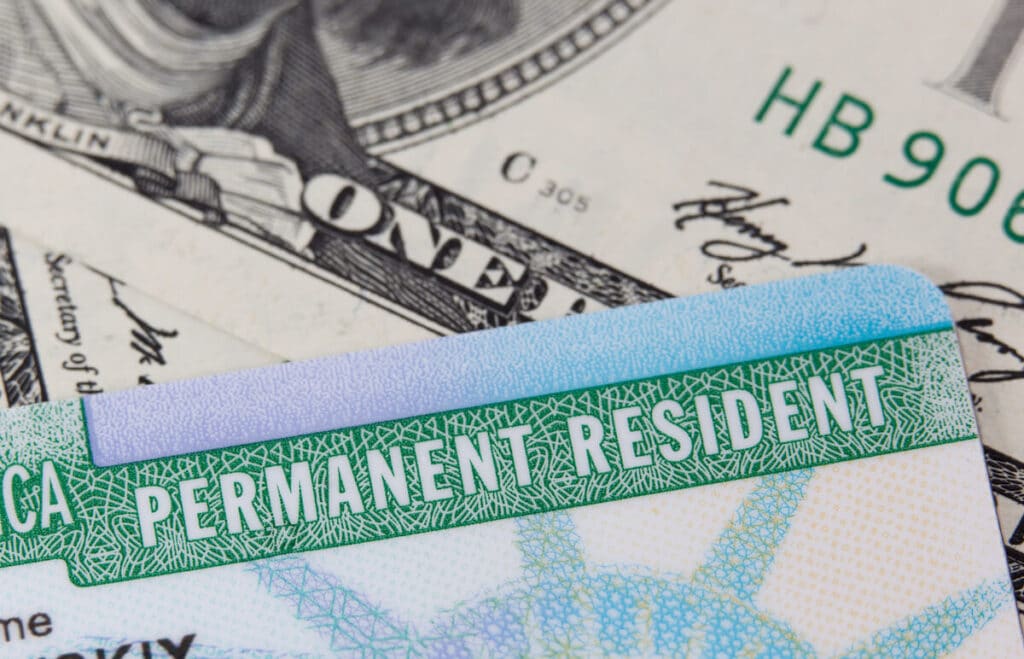Last updated on January 20th, 2024 at 01:08 pm

If you’re applying for an immigrant visa to the U.S., you’ll receive an alien registration number, or an “A-number,” to identify you on certain documents. The United States Citizenship and Immigration Services (USCIS) will provide you with an A-number whether or not you’re granted permanent residency.
So, when do you get an A-number, where can you find it, and how does it differ from other types of identification numbers?
Here’s everything you need to know about finding your alien registration number and using it during the U.S. visa application process.
What is an alien registration number?
An alien registration number is also referred to as an A-number or a USCIS number. It’s usually a nine-digit number with the letter A in front. In some cases, it may be as few as seven or eight digits. If yours is like that, you can add one or two zeros after the A if the form you’re filling out requires a 9-digit number.
What’s the difference between an A-number and a USCIS case number?
The alien registration number differs from your USCIS case number because it doesn’t change. Your A-number remains the same throughout your entire life. On the other hand, you’ll receive a new USCIS case number for each visa application.
It’s easy to tell the two of them apart because the USCIS case number is longer. It comprises 13 characters: three letters followed by ten numbers.
Is the A-number the same as the EAD number?
What about your Employment Authorization Document (EAD) number? If you apply for a work permit, this nine-digit number will be the same as your alien number.
However, the EAD card number (three letters and ten numbers) is not identical to the alien registration number.
Who gets an alien registration number?
All new immigrants to the U.S. get an alien number, usually during their first interaction with USCIS or the Department of Homeland Security.
This includes Deferred Action for Childhood Arrivals (DACA) recipients, refugees and asylum seekers, and applicants for work or spousal visas. F-1 student visa holders who apply for work authorization through the Optional Practical Training program may also receive an A-number, even though an F-1 visa is technically a temporary visa.
However, not everyone who interacts with the U.S. Citizenship and Immigration Services gets an alien registration number. For instance, U.S. citizens don’t have an A-number. They can use their Social Security Number as a unique identifier on many types of documents.
Temporary visitors to the United States don’t get or need an A-number, either. If you’re visiting on a tourist or other nonimmigrant visa, you won’t receive one.
Where can you find your A-number?

Let’s say you’re a noncitizen immigrating to the U.S. Do you have an A-number yet, and if so, where do you find it? There are several places you can look for it:
- On your USCIS receipt notice. Once you’ve submitted an application, USCIS will send you a receipt notice with your A-number printed on it.
- On the USCIS Immigrant Fee handout. If you’re outside the U.S. when you apply, you’ll need to attend an interview at a U.S. consulate or embassy. You’ll receive a handout with your A-number on it at your consular interview.
- On your visa stamp. If you’ve been granted an immigrant visa overseas, you should have received a stamp in your passport with your A-number on it.
- On your permanent resident card. If you’re already a green card holder, you can find your alien registration number in the field marked A# or USCIS#.
- On your work permit. You can also find it on the field marked USCIS# on your Employment Authorization Document or work permit.
In short, any document you receive from U.S. immigration authorities regarding your immigration status should have your alien registration number on it.
Other documents that should contain the A-number are your immigrant data summary and a notice of action from the Department of Homeland Security.
If you lost these documents, you still have options: you may schedule an appointment with USCIS to locate your A-number or file a Freedom of Information Act (FOIA) request to get access to your immigration file.
When do you get an alien registration number?
With alien registration numbers, you don’t have to worry about eligibility—you’ll get one automatically once you fill out your immigration forms.
How soon you get your alien registration number depends on what type of visa you’re applying for, where you’re located, and how far along you are.
You should receive your A-number in fewer than 30 days if you’re the spouse of a U.S. citizen applying from within the United States. If you’re outside the U.S., you’ll receive your A-number during consular processing.
If your spouse is a green card holder and not a U.S. citizen, then it can take up to a year before you receive your A-number. You’ll have to fill out Form I-130 (Petition for an Alien Relative) before you can submit your green card application (Form I-485).
H-1B visa holders will only receive an alien registration number when their employer submits Form I-140 (Immigrant Petition for Alien Worker).
Remember, if you’re a DACA recipient or an F-1 student with work authorization, you may have received an alien registration number already.
What is an A-number used for?
You primarily use an alien registration number for interactions with USCIS. It’s unlikely that other government agencies will request it. Unlike your Social Security Number, you won’t need to provide it with employment documents or tax forms. For example, the IRS requires your Taxpayer Identification Number or SSN, not your A-number.
Here are a few cases when you’ll need your alien registration number:
- Renewing your green card
- Applying for work authorization
- Applying for citizenship by naturalization
- Petitioning for a spouse or relative’s visa
Does an alien registration number expire?
Your alien registration number doesn’t have an expiration date. You’ll use the same number on any subsequent applications.
However, you’ll need to renew your immigration status every ten years to maintain permanent residency.
Once you’ve lived in the U.S. for at least five years as a permanent resident, you can apply for citizenship by naturalization. If you meet the requirements to become a U.S. citizen, you’ll no longer need an alien registration number.

Send money home with Remitly
Once you’ve arrived in the U.S., chances are you’ll want to find employment, open a bank account, and find a way to send money to family and friends back home.
With Remitly, it’s easy to transfer money from the U.S. to over 130 countries around the world. Simply connect your bank account or use a debit or credit card to send money to recipients in any of the countries we support.
Download the app today, and we’ll help you get started.
